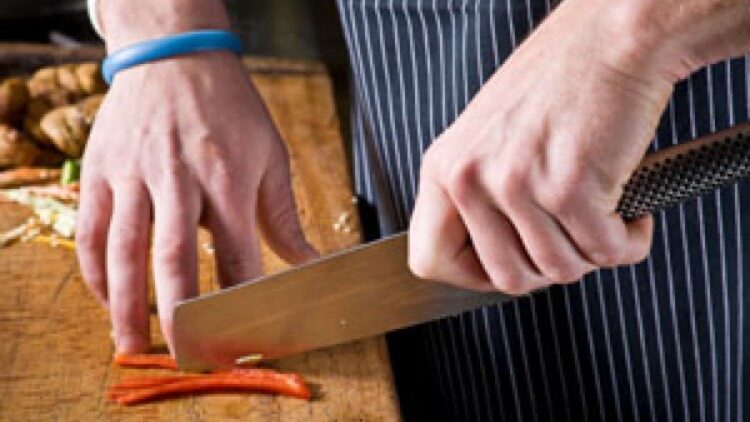
For my entire working life I have had an absolute obsession with knowing everything there is to know about my profession. I am not deluded and completely accept the fact that this will never happen but that is not going to stop me from trying. I am a student of cuisine and being the good student that I am, I study! I have spent thousands of pounds on cook books from all over the world, I forgo purchases that are unnecessary to life to save the money to eat in the restaurants that I read or have heard about, but most importantly I practice, practice, practice, practice.
I often tell the younger chefs in our company about how I used to go home and practice the perfect rocher on endless tubs of ice cream or anything else of a similar texture (and my never ending search for the perfect spoon to pull these off). The dozens of containers on my kitchen work top containing natural yeast ferments using different flours and ratios in my pursuit of the ultimate sourdough or even my purchasing of ten fish tank pumps to crack the production of fruit and vegetable vinegars.
Part of my studies is to memorise the rules, the foundations of what we do and how to do it. Things that I have been told my entire career and just accept without question.
- Never roast fish bones for stock or use oily fish
- Seal your meat before roasting to seal in the juices
- Never put a lid on a stock
- Always refresh vegetables in ice water to keep their colour
- Constantly stir risottos adding small amounts of stock at a time
- And so on
You follow these rules without question because at the time they make sense. Then along came a whole new way of thinking. Lead by of all people scientists. People like Harold Mcgee started to question the rules. Chefs like Heston and Pierre Gagnaire started to apply their new theories in the food and it has caught on like wild fire.
This started a whole new way of thinking for chefs all over the world. With science behind you, can you make better food?
Why don’t you roast fish bones for stock? I would rather eat a roasted piece of fish over a boiled one!
When cooking a stock, steam is produced. The beautiful smell of meat bones fills the kitchen and all the chefs are happy. Smell means flavour and it is just floating away into the kitchen and up the extraction vents. If you put a lid on this pan the steam which contains so much of this flavour, hits the lid and is dropped back into the stock.
As for green vegetables, this is something I only discovered the day before writing this blog. I was holding a presentation to chefs and managers in the company, based on seasonality and vegetable cookery. Demonstrating how to bake vegetables whole in their skins or in a crust. Different cooking methods that produce a deeper and much more improved flavour and mainly treat your vegetables with more respect.
As I was preparing bits and pieces for this demo, I remembered something I read in a book from Daniel Patterson. He is a pioneer in vegetable based cooking and his methods have been recreated all over the world. One statement he made which immediately caught my interest was to never refresh your vegetables in ice water. This is something that everyone and I mean everyone does! Your beautiful green vegetables will go brown if you don’t, Right?
I tested this on a few different beautiful vegetables we had kicking around the kitchen. Broccoli, savoy cabbage, green beans etc… I cooked them for the exact same time in the same pot of water, but the only difference was that I put one piece in to ice water and another onto a chopping board that just sat out on the side. I waited a few minutes, expecting for the un-iced veg to turn a murky shade of brown and thus confirming my beliefs for the last 16 years but it didn’t happen. I pulled the vegetables from the ice water bath to see if there were even brighter than the ones on my chopping board, but they weren’t. They were the exact same, except for one thing. The vegetables that had not entered that icy bath had remained warm and tasted better. It all makes sense now!
In its simplest of break downs, if you add water to anything be it tea, custard, soup or vegetables you are diluting the flavour! The next time you blanch and refresh anything just pick it up and squeeze it in-between your hands and when all that water comes running out, you will know what I mean.
The main point I would like to get across from this rant is that we are told things by other people our entire lives and we just accept them without question. Don’t swim after eating, cheese before bed will give you nightmares, carrots make you see better in the dark, you must have jacket potatoes in your restaurant every day and fried fish on a Friday and so on…
If there is one piece of advice that I can give any of the chefs in this company it is:
Do not accept what people tell you and question everything! Why do we do this? What would happen if we did that? Why don’t we try this!
A friend of mine always tells me “if you always do what you have always done, you will always get what you have always got”
Maybe there is something even better out there waiting to be found.
Pete Redman, Executive Chef
bartlett mitchell
Share on:
My earliest food memories are of my mum’s baking; coconut pyramid cakes were my favourite.
More from Wendy Bartlett